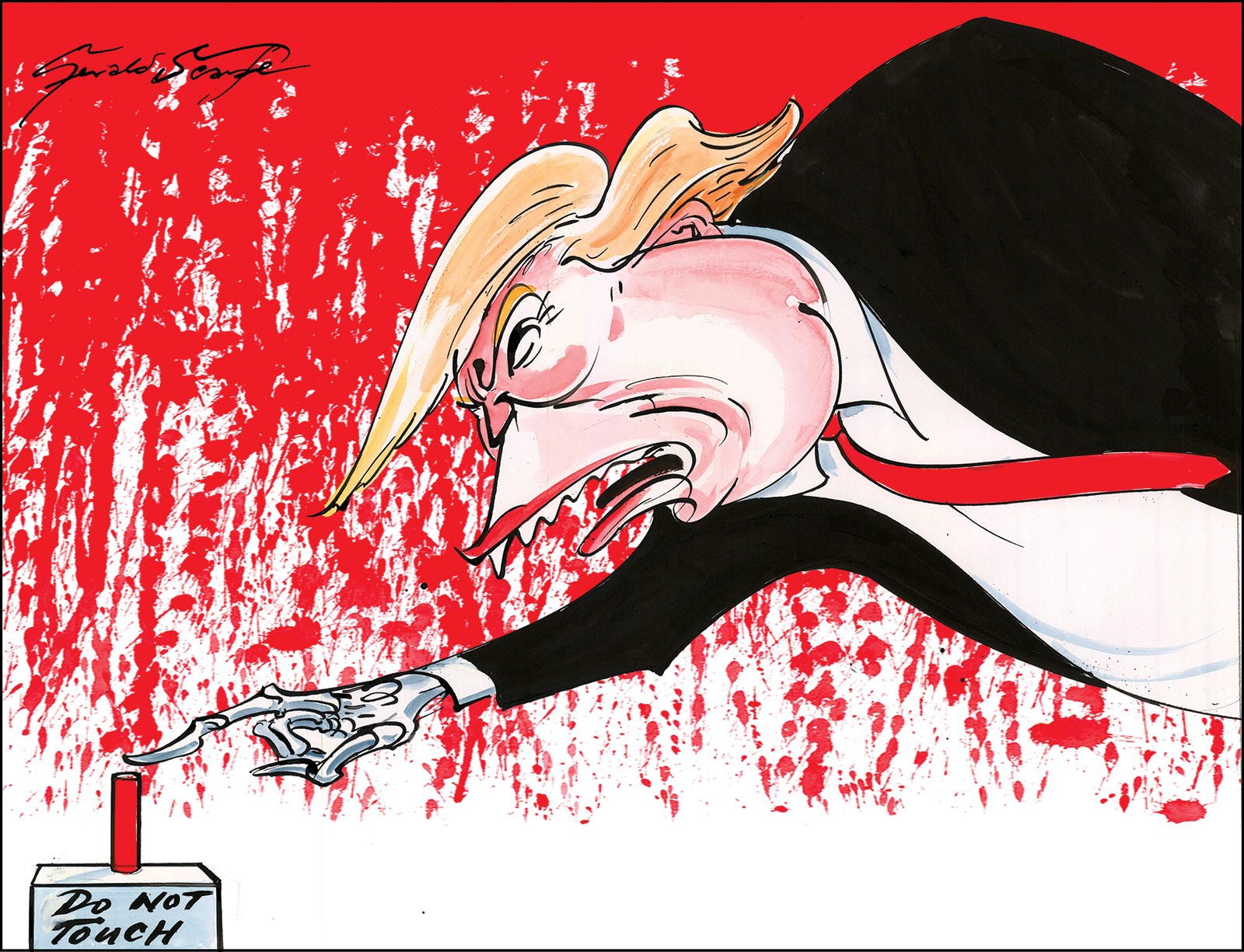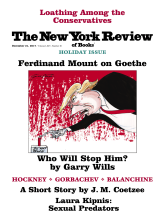Donald Trump has threatened “Little Rocket Man” with “fire and fury like the world has never seen”—not even seen, presumably, at Hiroshima or Nagasaki. We possess, after all, many more and much better (that is, much worse) explosives than were used by President Truman in 1945, when he incinerated those cities without Congress or the American people knowing we even had them.
The fact that President Trump (“old lunatic”) has a legally absolute power to destroy Kim Jong-un (“short and fat”) over dueling insults is so scary that Senator Edward Markey and Representative Ted Lieu are trying to restrict that absolute power, so that only Congress would have the authority to declare nuclear war. This seems not only reasonable but constitutionally necessary. The Constitution in fact denies the president the power to declare war and reserves it solely to Congress.
More than that, the framers clearly opposed the massing of power in the executive—lest it become the monarchy they had opposed with a revolution. They so feared one-man rule that they entertained the idea of a double executive (based on the ancient Roman consulship) or a legislative council. The single executive was adopted largely because James Wilson of Pennsylvania argued that it would make the president more impeachable (it would be hard to fix responsibility on members of a team or a council). They thought one man would be more accountable—not anticipating post-Constitution developments like “executive privilege,” the “classification” of secrets, and “the unitary executive” that would make him less accountable.
But now that we have traveled so far from constitutional government, what can we do? The atom bomb was born as a secret project of President Franklin Roosevelt, and then deployed by Truman without any but his own authority. Truman did not even know, as vice-president, that Roosevelt was developing this new weapon until he became the chief executive himself and was let in on the secret. Then, after the bombings of Japan were sprung as a surprise on the whole world, presidential authority to keep and use the “Bomb” (soon to be a vast arsenal of hydrogen explosives) was extended undiminished in the Atomic Energy Act of 1946.
Ever since, every president carries with him wherever he goes the “football” containing the codes for the immediate arming and launching of obliterative missiles. As Vice President Dick Cheney said of President George W. Bush’s war power in 2008, “He could launch the kind of devastating attack the world has never seen [that phrase again]. He doesn’t have to check with anybody, he doesn’t have to call the Congress, he doesn’t have to check with the courts.”
The symbolism of that tremendous power has put the nation on a permanent war footing—so much so that we think and talk about the president as “our commander in chief,” though the Constitution does not give him that power over citizens but only command “of the Army and Navy of the United States, and of the Militia of the several States, when called into the actual Service of the United States” (Article 2, Section 2). That is: he is not even the commander in chief of the National Guard in its normal service in the separate states, only when it is nationalized for use in the country’s wars.
The war footing of the presidency in 1946 was the setting of the Atomic Energy Act. President Truman did not know what conditions would prevail after World War II. He did not want to give up any of the vast powers the executive had accumulated in that conflict. He tried to impose universal military training on all young males. He tried to prevent strikes by drafting coal miners and steel companies into military service, since all sources of strength were to be at his disposal as our commander in chief. He did not ask Congress for approval of American intervention in the Korean War, since his secretary of state, Dean Acheson, said that might weaken his power to respond instantly to nuclear threats. There was a wartime edginess then not only over the Soviet threat from abroad but from inner subversion that had to be guarded against by “classification” of our many secret programs, loyalty oaths, and extensive monitoring and blacklisting of suspected leftists. (In the 1950s, Donald Trump’s dogged defenses of the Russian leader and government would have made him unemployable on TV as a loyalty risk.)
War conditions, instead of fading after the defeat of the Axis, found new homes as fresh threats came. World War II melded into the cold war, which has melded into the “war on terror.” There was no reduction in arms expenditures between the “end” of one peril and preparation for the next. When Truman was given his authority over the Bomb, there was at first not a full deployment of nuclear production and delivery systems. The president thought he could preserve a nuclear monopoly.
Advertisement
As other nations have acquired the Bomb, we have had to develop strategies for containment with them. The “nuclear club” now numbers nine, while other countries are working to develop their own nuclear weapons. As each one acquired the Bomb and different degrees of deliverability, there was a temptation to think the scourge of further spread could be eliminated by a preemptive strike; but the danger of again using any nuclear weapon was too terrible to be entertained, and the notion that a first blow would not be followed by a renewed nuclear program was seen to be chimerical. So attempts at treaties and other agreements restricting production or proliferation were explored. (Even when George W. Bush launched a false-alarm attack on Iraq’s nonexistent “weapons of mass destruction,” it was at least not a nuclear attack.)
When the Constitution granted one person the executive power, there was an expectation that he would consult experts—scientific, military, and diplomatic—before making his decisions. He was given a power that he was expected to use:
He may require the opinion, in writing, of the principal officer in each of the executive departments, upon any subjects relating to the duties of their respective offices. (Article 2, Section 2)
This power of inquiry is in fact a duty, one that President Trump has neglected. Rather than consult the officers trained and reporting to the president, he has mocked the most experienced intelligence veterans (calling them political hacks), dismantled the government’s scientific bodies (as promoting hoaxes), drained the diplomatic agencies (as useless bureaucrats), and reduced or eliminated national commitments to other countries. He says he does not need expertise; he knows more than experts; he has a very good brain, which is his greatest and often his only resource. This neglect of necessary requirements for governing offers in itself grounds for impeachment, but he is hasty enough that in the long impeachment process he might be goaded to use the very nuclear power whose duties he has not prepared himself for using responsibly.
The assumptions that Congress made about the conduct of President Eisenhower or President Reagan—that they could be counted on to act with humble precaution—no longer seem to apply. What can be done? There comes a time when, as Cicero put it, “The highest law should be preservation of the people,” Salus populi suprema lex esto. A crisis sufficient to justify use of this maxim cannot be predicted. It could be any first nuclear strike the president may order. Only extreme peril can justify an extreme remedy. It is said (I don’t know with what truth) that in 1974, Secretary of Defense James Schlesinger told the implementers that in the event of a nuclear order from President Nixon, who was in a massive drunken funk, they should clear it with him.
We can only hope that there are high-ranking patriots who might act like that if Big Rocket Man went after Little Rocket Man. Even a soldier in the field must disobey a truly disastrous order from a manifestly disabled officer. The commander in chief has to be held to the same standard as his subordinate commanders, for the preservation of the people. It is reassuring to know that the current commander of the US Strategic Command, Air Force General John Hyten, as well as a former one, General Robert Kehler, recognizes this as a rule of international law.*
—November 22, 2017
This Issue
December 21, 2017
Lies
Kick Against the Pricks
The Man from Red Vienna
-
*
Kathryn Watson, “Top General Says He Would Resist ‘Illegal’ Nuke Order from Trump,” CBS News, November 18, 2017. ↩




